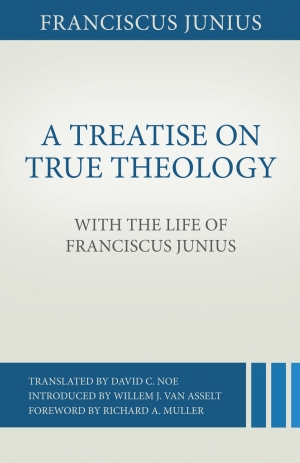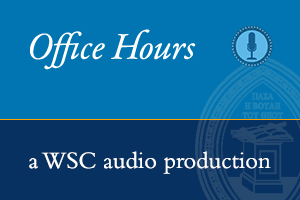My friend and colleague Mike Brown published a revision of his excellent MA (Historical Theology) thesis (Westminster Seminary California) in 2012 as Christ and the Condition: The Covenant Theology of Samuel Petto (1624-1711). As part of the background to explaining Petto, Mike . . . Continue reading →
Reformed Orthodoxy
Calvin’s Theology And Its Reception: A Review
What should we do with John Calvin? What if, on the way back from dinner, we drove through a wormhole into a parallel universe and found John Calvin sitting on our sofa when we arrived home? What would we do with him . . . Continue reading →
HT611 Reformed Scholasticism
Course Description A study of theology and methods of Reformed orthodoxy from 1561–1725. Special attention will be given to soteriology. Fall. 2 Credits. Course Goals — Academic Goal: To enable the student to understand and discuss intelligently the development of Reformed academic theology . . . Continue reading →
Beza’s Summa Totius Christianismi
Theodore Beza Geneva, 1555 trans. William Whittingham (1575) revised by R. Scott Clark (2002). The question of God’s eternal Predestination is not curious, or unprofitable, but of great importance, and very necessary in the Church of God. p. 2 THE FIRST CHAPTER. 1. . . . Continue reading →
If Only Someone Would Translate These…
The Heidelblog is devoted to recovering the Reformed confession. In this context the word confession has two senses. In the first sense it refers to the official, ecclesiastical, public, constitutional documents to which ministers and elders subscribe and to which members of . . . Continue reading →
Johannes Marckius On Witsius’ Embassy To England
…He had always the preference given him in their synods, and was twice honored with the supreme government and headship of the university; namely, in the years 1686, and 1697. Nor must we omit, that when, in the year 1685, the states . . . Continue reading →
Now In English: Junius On True Theology
Lambert Daneau (1530–95) described Franciscus Junius as “a man of singular learning”—and that he was. His biblical scholarship was cited widely by writers from a variety of traditions in the sixteenth and seventeenth centuries. His influence on the Reformed tradition has been . . . Continue reading →
Reformed Orthodoxy On Holiness Of The Spirit
The Spirit, further, is called “Holy” because, on the one hand, of “his unsullied purity and glorious majesty”—not, however, as if he were holier than the Father and the Son, for all are holy and “the divine holiness, being infinite, does not . . . Continue reading →
New In Translation: The Synopsis Of A Purer Theology
When I began reading Reformed theology in university Calvin was virtually the only sixteenth-century Reformed author widely available in English translation. The other authors I read were all from the 19th and 20th centuries (e.g., Hodge, Warfield, Van Til, Murray). In the . . . Continue reading →
Office Hours: Calvin And Voltaire
When most of us think about the history of Reformed theology, if we think about it at all, we tend to think first of Calvin and then we typically jump to Jonathan Edwards, then perhaps to Princeton and thence to our own . . . Continue reading →
Office Hours: What Happened To Reformed Orthodoxy? (1)
In the well-researched and written volume, Calvin Meets Voltaire: The Clergy of Geneva during the Age of Enlightenment, 1685-1798, Eighteenth-Century Studies Series (Ashgate: 2014), Jennifer Powell McNutt argued that there was more continuity, than has sometimes been thought, between 18th-century Genevan theology, . . . Continue reading →
Office Hours: What Happened To Reformed Orthodoxy? (2)
In the well-researched and written volume, Calvin Meets Voltaire: The Clergy of Geneva during the Age of Enlightenment, 1685-1798, Eighteenth-Century Studies Series (Ashgate: 2014), Jennifer Powell McNutt argued that there was more continuity, than has sometimes been thought, between 18th-century Genevan theology, piety, . . . Continue reading →
Roger Nicole On Amyraut’s Testimony At Alençon (1637)
1. Naturally enough, in the explanations they gave, Amyraut and Testard sought to conform their presentation and language as closely as they could to the traditional Reformed views without making an outright disavowal of their previously printed sentiments. It would be difficult . . . Continue reading →
Office Hours: With Dolf te Velde Learning To Love Reformed Orthodoxy
One of the great benefits of studying at Westminster Seminary California is the opportunity it gives both faculty and students to meet and learn from scholars from all over the world. This week we were blessed to have on campus to speak . . . Continue reading →
Harrison Perkins With 8 Minutes And 53 Seconds On The Reward Offered To Adam In The Covenant Of Works
The Ministers Of London On The Validity Of Roman Catholic Baptisms (1647)
CONSIDERATION TWO. That though a ministerial succession should be granted to be drawn through the Church of Rome, and that from the days of the first apostasy in that church to the times of Protestant Reformation, yet thereby the truth of that . . . Continue reading →
What Is Orthodoxy?
A reader wrote to ask about the definition of orthodoxy. Continue reading
New In Print: Petrus van Mastricht, Theoretical-Practical Theology vol. 3: The Works of God And The Fall Of Man
Petrus van Mastricht (1630–1706) was among the more important Reformed theologians of the later 17th century. According to Richard Muller, in van Mastricht we see Reformed orthodoxy and scholasticism coming to its high point technically. So students of the history of Reformed . . . Continue reading →
Review: Calvin’s Theology And Its Reception Edited by J. Todd Billings and I. John Hesselink
What should we do with Calvin on the sofa? The answer to that question depends on one’s job description. Continue reading →
Perkins: Salvation, All Of It, Is By Grace Alone, Through Faith Alone
As part of my response to the claim that some Reformed orthodox theologians taught that salvation was not only in two stages but also, in some way, through works, I appealed to a quotation from William Perkins. I could have written much . . . Continue reading →











